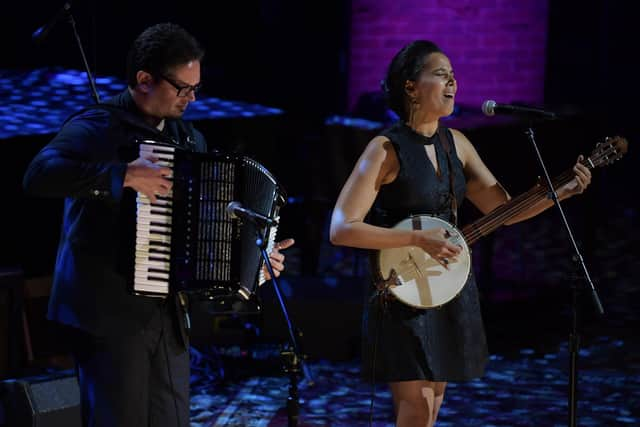Rhiannon Giddens: ‘The banjo was an African instrument’
Listening to Rhiannon Giddens sing is not just to experience a memorable lesson in African-American history and injustice; it’s to hear musical history re-written, with genres such as bluegrass re-connected with their African roots.
The double Grammy-winning Giddens sings with passion, often with outrage, as in the slow-burn of a song such as At the Purchaser’s Option, inspired by a historical newspaper advertisement for slaves; or the condemnatory gospel of Richard Fariña’s Birmingham Sunday, about a white supremacist atrocity.
Advertisement
Hide AdAdvertisement
Hide AdThere is much else, of course – blues, bluegrass, not to mention the odd excursion into opera or Italian folk. She sings them all in her muscular, folk-inflected soprano, accompanying herself deftly on banjo or fiddle, while her multi-instrumentalist partner, Francesco Turrisi, adds further accompaniment, all of which can be experienced when the duo play Edinburgh’s Assembly Music Hall on 28 April to open the city’s annual Tradfest (also Aberdeen Music Hall, 27th; Perth Concert Hall, 30th).


Giddens has been described as reintroducing – and she puts a lot of emphasis on that “re” prefix – diversity into bluegrass and other areas of American music normally regarded as preserves of white culture. “My whole entry into folk music was the discovery that there was this huge history that had been suppressed and erased and that the banjo was an African instrument, invented by black people.”
Hence the Grammy Award-winning string band she co-founded, the Carolina Chocolate Drops, largely inspired by the late North Carolina black fiddle-player Joe Thompson. “ I think it’s important to talk about it now, because there’s this ongoing effort to separate the races and say that white people do this and black people do that and that we’re not the same – but the music shows that we’re constantly coming together to make art.”
For Edinburgh, she promises songs from the duo’s past two albums, They’re Calling Me Home and There Is No Other, as well as fresh material. Along with Giddens’s trusty banjo, fiddle and viola, accompaniments are further enriched by Turrisi’s accordion, percussion and assorted strings. “If you can’t bring a band, bring a bucket of instruments,” she laughs.
Giddens trained as an opera singer and her insouciant disregard for genre conventions means she might follow an old-time staple or an impassioned protest song with some Monteverdi or a rollicking Puglian tarantella. “It’s simply part of who I am and one of the reasons Francesco and I meet on so many different levels and play music together.
“This idea of genres being separated, that you can only do one kind of music, is a very recent thing. Particularly looking at American musical history before the recording era, there were concerts with opera arias next to a minstrel show, next to a dog balancing a banana on its nose … All we’re doing is just going back to the old traditional way.”
Her own output has certainly been eclectic, with ballet and opera compositions under her belt. Splitting her time between Ireland and the US, she also keeps busy as director of the Silkroad Ensemble, another Grammy winner, founded by cellist Yo-Yo Ma to promote cross-cultural understanding through collaborations between musicians from numerous nationalities and cultural traditions.
Advertisement
Hide AdAdvertisement
Hide AdGiddens and Turrisi’s concert opens Tradfest’s 11-day programme of concerts, ceilidhs, films, storytelling sessions and much else, largely at the Traverse Theatre and the Scottish Storytelling Centre. A further transatlantic guest is American old-time star Dirk Powell, with whom Giddens has frequently collaborated, while Scots talent includes Orcadian band Fara, flute and pipe tradition bearers Cathal Connell and Allan Macdonald, cellist Juliette Lemoine, singers Jim and Susie Malcolm, and a final night bash pairing pipes and whistle ace Ross Ainslie with accordionist-guitarist Tim Edey.
And on Sunday, 7 May, the festival’s third Rebellious Truth lecture, presented by Edinburgh University’s Department of Celtic and Scottish Studies, comes from Gaelic singer Mischa Macpherson, with the department’s traditional artist in residence, Fraser Fifield, performing a set.
For full details, see www.edinburghtradfest.com